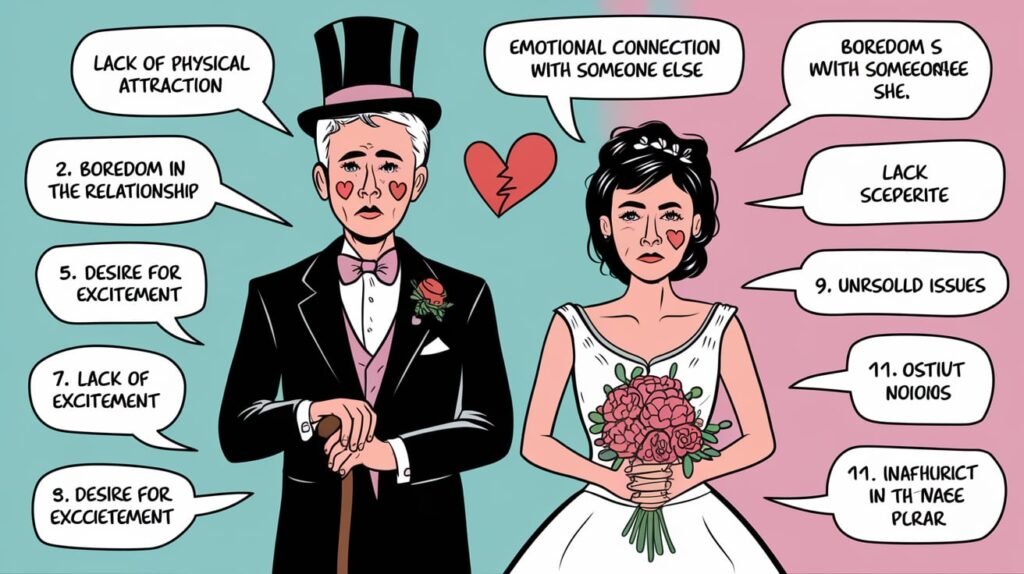Falling in love with your soulmate is like living out a fairy tale. But what happens when the person you thought was your “forever” betrays your trust? Cheating, unfortunately, can happen even in the most seemingly perfect relationships. Whether due to emotional neglect, temptation, or deeper unresolved issues, infidelity is a complex issue that can be hard to understand. In this article, we’ll dive into expert insights to uncover why people cheat on their soulmate and what you can do to prevent or heal from it.
1. Lack of Emotional Fulfillment
Even soulmate relationships aren’t immune to emotional disconnect. When one partner feels unappreciated or neglected, they may seek validation elsewhere. In these cases, the affair often isn’t about love or attraction but about finding someone who will listen, appreciate, or emotionally support them. The lack of emotional fulfillment slowly erodes the relationship’s foundation, leaving one partner vulnerable to outside attention.
Tip: Stay connected by regularly checking in with each other about emotional needs. Open, honest communication can often prevent feelings of isolation or neglect from creeping in.

2. Sexual Dissatisfaction
Sexual intimacy plays a significant role in maintaining a healthy, committed relationship. When sex becomes infrequent or unsatisfying, it may leave one partner feeling frustrated or disconnected. This dissatisfaction can lead to infidelity as an attempt to reignite that physical spark—outside the relationship.
While this doesn’t mean the cheater loves their soulmate any less, they’re seeking physical fulfillment they feel is missing at home.
Tip: Keep the spark alive by being open about your sexual desires and experimenting together. Prioritize intimacy and make time to reconnect physically.
3. Desire for Novelty and Adventure
The thrill of something new is hard to resist, even for people in loving, long-term relationships. The excitement of a forbidden relationship—full of novelty, secrecy, and adrenaline—can be a powerful temptation. Some individuals cheat simply because they crave a break from routine, seeking the rush that a new experience provides.
Tip: Inject novelty into your own relationship! Try new activities together, surprise each other, and keep things fun and adventurous to avoid the trap of monotony.
4. Fear of Commitment
Even if a person feels they’ve found their soulmate, the fear of commitment can trigger self-sabotaging behaviors, including cheating. Some individuals struggle with the idea of losing their independence or feel anxious about being “tied down” forever. Infidelity becomes an escape, allowing them to delay fully committing.

Tip: Open conversations about long-term goals and fears can help address these concerns. Acknowledging the fear of commitment doesn’t have to mean the end of the relationship—it can actually strengthen your bond.
5. Opportunity and Temptation
Sometimes cheating happens simply because the opportunity arises, and the person lacks the self-discipline to say no. This is especially true when boundaries haven’t been clearly defined within the relationship. Temptation can be powerful, and without firm personal values or strong communication about what constitutes cheating, even someone deeply in love with their soulmate might stray.
Tip: Set clear boundaries and expectations early in your relationship, ensuring both partners understand what constitutes infidelity.
6. Lack of Communication
Poor communication is one of the biggest relationship killers. When couples don’t openly discuss their needs, feelings, or frustrations, misunderstandings can grow into major issues. People sometimes cheat because they feel unheard, or they’re afraid to bring up uncomfortable topics, hoping an affair might fulfill what they aren’t getting at home.
Tip: Make it a habit to talk openly, even about the hard stuff. Healthy communication is the glue that holds soulmate connections together.
7. Low Self-Esteem
People who struggle with self-worth may cheat to boost their ego. The attention from someone outside the relationship can temporarily make them feel more attractive, confident, or valued. While they may still love their soulmate, they use infidelity as a way to validate themselves.

Tip: If self-esteem issues are a factor, seeking therapy or working together to build self-confidence can help address this root cause.
8. Resentment or Unresolved Conflict
Resentment, if left unresolved, can quietly poison a relationship. Some people turn to infidelity as an act of revenge or as an escape from unresolved anger. When conflicts pile up, cheating may feel like a release valve, even though it ultimately causes more harm than good.
Tip: Don’t sweep problems under the rug. Address conflicts head-on with a calm, solution-oriented mindset to prevent long-term resentment.
9. Influence of Past Trauma
People who have experienced trauma in previous relationships or childhood may cheat as a coping mechanism. This is especially true for those who fear vulnerability or emotional intimacy. They might believe cheating is a way to protect themselves from getting hurt, or they may struggle with trust due to past experiences.
Tip: If past trauma is affecting your relationship, professional counseling can be invaluable in addressing these issues before they lead to infidelity.
10. Misaligned Expectations
Even in soulmate relationships, partners might have differing ideas of what their relationship should look like. These mismatched expectations can lead to disappointment, frustration, or even infidelity. For example, one partner might expect constant affection and attention, while the other needs more independence.
Tip: Discuss your relationship expectations openly and often. It’s important to be on the same page about what you both want.
11. Incompatibility in Long-Term Goals
While you may feel an instant connection with your soulmate, long-term incompatibility can surface over time. Differences in goals—such as whether to have kids, where to live, or career paths—can create stress. If these issues aren’t resolved, one partner may stray, feeling uncertain about the future.
Tip: Regularly check in on long-term goals to make sure you’re growing in the same direction, or find ways to compromise that align with both your visions for the future.
12. Unresolved Personal Issues
Sometimes the problem isn’t the relationship but personal struggles such as mental health issues, addiction, or emotional baggage. Infidelity can be an unhealthy way to cope with inner turmoil or distract oneself from personal pain.
Tip: Encourage each other to seek help for personal issues that could impact your relationship. Self-care and therapy can play an essential role in maintaining a healthy connection.
Can a Relationship Survive Infidelity?
Yes, a relationship can survive infidelity, but it’s not easy. Rebuilding trust takes time, commitment, and sometimes professional help. Couples who are open to intentional dating—a mindful, committed approach—can work through the betrayal by focusing on healing and reconnection. Both partners must be willing to put in the effort to recover from the hurt.
Finding Guidance in Soulmate Tarot and Sketches
If you’re searching for clarity after infidelity, some people turn to spiritual tools like soulmate tarot readings or commissioning a soulmate sketch to reflect on their relationship’s future. While these practices aren’t a substitute for therapy or communication, they can offer a unique perspective on your connection.
Conclusion
Infidelity in a soulmate relationship is often a sign of deeper issues like poor communication, unresolved trauma, or emotional neglect. By identifying these problems early and working to address them, couples can potentially avoid the pain of cheating. For those who have experienced infidelity, healing is possible through patience, communication, and intentional effort.
FAQs:
Can a soulmate cheat?
Yes, even soulmate relationships can experience infidelity. Soulmates are not immune to the challenges that all couples face.
How can I prevent cheating in my relationship?
Prioritize open communication, emotional fulfillment, and intentional dating to build a strong foundation of trust and intimacy.
What is intentional dating?
Intentional dating is a mindful approach to relationships, focusing on personal growth, communication, and long-term compatibility.
What are soulmate tarot readings?
Soulmate tarot readings offer spiritual insights into your romantic connections, helping you reflect on your relationship’s dynamics.
Can cheating be forgiven in a soulmate relationship?
Forgiveness is possible, but it requires time, effort, and a mutual commitment to rebuilding trust and healing together.
